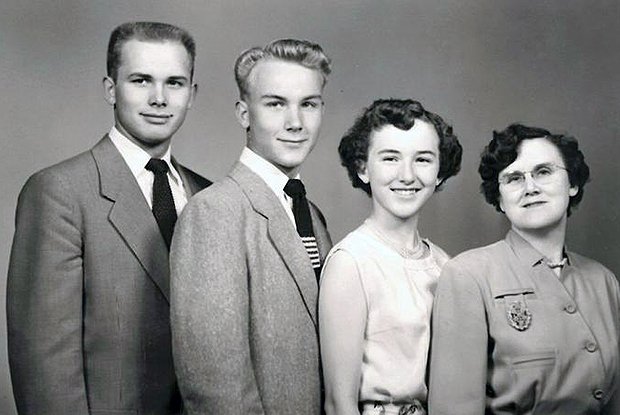ABOUT STELLA H. OAKS
Dallin, Evelyn, Stella, & Merrill
Stella Harris was born July 27, 1906, and raised in a farmhouse near Payson, Utah that did not have running water and indoor plumbing. Her father Silas Albert was a poet, idealist, and schoolteacher driven to farming by economic necessity. He gave Stella a love of books and learning and, in her words, "a joy in living intellectually." Her mother, Chasty, was a gifted homemaker and an articulate teacher of pioneer and family values. Stella's parents were united in their religious faith as members of The Church of Jesus Christ of Latter-day Saints.
As the oldest of four children, Stella helped her family struggling to eke out a living on a new farm. She thinned beets, operated farm machinery, milked cows, tended her siblings, and carried on household duties.
Stella attended Brigham Young University where she met and fell in love with Lloyd E. Oaks of Vernal, Utah, one of 16 children whose parents were poorer than hers. His father was a rancher and his mother died shortly after the birth of their youngest child. Lloyd graduated and moved to Philadelphia for medical school. Stella attained a bachelor’s degree in 1927 and began teaching to pay her school debts and to enable her younger sisters to go to college.
Finally, after four years of courtship and separation, Stella and Lloyd married in 1929. She joined him for his final year of medical school and a one-year internship.
Widowed
Ten years after completing his degree, Dr. Lloyd E. Oaks died in June 1940, leaving Stella a widow with three young children: Dallin, 7, Merrill, 4, and Evelyn, 1. She moved the family from Twin Falls, Idaho where her husband had a thriving medical practice (eye, ear, nose, and throat), to her parents’ home in Payson, Utah. All she had sacrificed and worked for seemed gone. Her world was shattered.
Dallin, Merrill, Evelyn, & Stella
Health Crisis
Six months after Lloyd’s funeral, Stella left her little ones with her parents and journeyed to Columbia University in New York City to begin studies towards a Master’s Degree, but it was too soon. She recorded:
“As the weeks went by my heart…ache[d]…for my children…. I studied harder and longer in an effort to cope. One day as I was trying to write I was aware that my hands were trembling and that I could no longer recall the names of my children…. I began to sob and felt myself engulfed in a dark abyss from which I had not the power to raise myself. Though I was within three weeks of finishing the term, I could not do it. I was given incomplete grades and comforted by a counselor who said that in six or eight years I would get hold of myself and be able to return for completion…. This was the lowest ebb of my life; I had lost everything even myself.”
Going Forward
Within 15 months of returning from New York City, she had recovered sufficiently to begin a teaching job in Vernal, Utah, and to live independently with her children. She was a highly influential high school teacher and became so emotionally strong that she held positions of responsibility in schools, community, and church.
Despite her meager teaching salary, and after only three years’ absence, Stella returned to Columbia University for several spring and summer sessions to complete her Master’s Degree in Guidance and Personnel Administration in August 1946.
In 1948 she moved to Provo, Utah so her children could live at home and attend the university. In Provo, her job included directing the Adult Education programs for Provo schools. A favorite duty was to help students who had not finished high school attend classes to receive the equivalent certification and obtain better employment opportunities.
Important among her community activities was her advocacy of mental health initiatives including the formation of a Child Guidance Clinic in Provo to help children with psychological difficulties. After her three children were raised, she was elected to the Provo City Council and served a term as Assistant Mayor. In her later years, she worked tirelessly for senior citizens’ causes.
Qualities
Stella was described as an incurable optimist. A long-time newspaper friend described this quality in a column about her: “Stella Harris Oaks is the eternal optimist. She could never see the gloomy side of anything. It used to irritate me now and then. Impractical, too idealistic, too Pollyanna, I would think. But I came to realize she was, indeed, practical---and that her idealism enabled her to achieve many things she would not otherwise have tackled.” (Theron H. Luke, "Some Flowers for the Living—Stella Oaks," Provo Daily Herald, May 3, 1978, p. 31)
Merrill, her second child, wrote, “[Mother’s] optimism affected us, children. We developed a positive outlook in our own lives as we were raised by such an upbeat mother who never in our hearing made any complaint about the challenging situation of her life.”
Evelyn, the youngest child, said, “When I was in high school and old enough to help her with her hair, she read aloud to me by installments…Sir Walter [Scott’s] The Lady of the Lake…. That way she saved precious time, shared a classic piece of literature with her daughter, and made a sweet memory with me.”
Stella H. Oaks was a woman who overcame great obstacles. Her three children are grateful to have been raised by a faithful, capable mother. They certainly missed having a father growing up, but readily acknowledge they are stronger people because they overcame the challenges faced due to his untimely death.
Stella's high visibility and conspicuous accomplishments, both in motherhood and in work and public life, made her a role model for many women, especially for widowed or divorced mothers struggling to earn a living and raise a family alone.
One of Stella’s Vernal high school students, Zelpha Cook Broadhead, attributed her successful life to a conversation in her English class with Stella as the teacher:
Stella’s children: President Dallin H. Oaks, Elder Merrill C. Oaks, & Evenly Oaks Moody (December 2022)
“I remember a little chat you had with us about going to college. You told us how you were able to go. I remember you saying anyone could go to college no matter how little money they had if they had the courage to try and a strong enough desire to go. I had always wanted to go to college but had more or less given up the idea as I knew the folks would not be able to help me. But I decided that day I would go to college. Things worked out, so I was able to complete all four years without stopping.”
This student ended up having to be the breadwinner in her family as her husband broke his back and was in the hospital for almost a year. She taught school and supported her family as her dear mentor, Stella, had done. Zelpha said, “I never would have been able to have taken this responsibility if it had not been for your help in giving me a determination to go on to school.” (Nov. 17, 1947)
Stella’s native intelligence, her teaching skills, her love for people, and her innate optimism made her a natural leader with a remarkable capacity to bring people together to accomplish a common task. Her effectiveness was magnified by the fact that she was indifferent to personal recognition and prominence.
Stella was a motivator. In an article in the Daily Universe written on the occasion of Stella’s death, Dallin said of his mother, she “always spoke the positive about everything and everyone. She made things happen in the family, school, and community because she just wouldn’t recognize the possibility that a good work could not be done or that good people—everyone, in her definition—would not want to and were not capable of doing it.”
Stella would be delighted to have her name associated with a foundation that assists single parents to attain an education to better their lives and the lives of their family.





